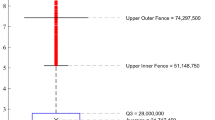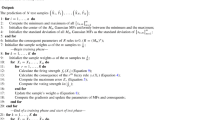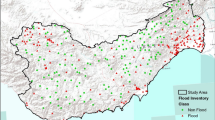Abstract
Artificial neural networks are often used to generate real appraisal models utilized in automated valuation systems. Neural networks are widely recognized as weak learners therefore are often used to create ensemble models which provide better prediction accuracy. In the paper the investigation of bagging ensembles combining genetic neural networks as well as genetic fuzzy systems is presented. The study was conducted with a newly developed system in Matlab to generate and test hybrid and multiple models of computational intelligence using different resampling methods. The results of experiments showed that genetic neural network and fuzzy systems ensembles outperformed a pairwise comparison method used by the experts to estimate the values of residential premises over majority of datasets.
Access this chapter
Tax calculation will be finalised at checkout
Purchases are for personal use only
Preview
Unable to display preview. Download preview PDF.
Similar content being viewed by others
References
Bagnoli, C., Smith, H.C.: The Theory of Fuzzy Logic and its Application to Real Estate Valuation. Journal of Real Estate Research 16(2), 169–199 (1998)
Borra, S., Di Ciaccio, A.: Measuring the prediction error. A comparison of cross-validation, bootstrap and covariance penalty methods. Computational Statistics & Data Analysis 54(12), 2976–2989 (2010)
Breiman, L.: Bagging Predictors. Machine Learning 24(2), 123–140 (1996)
Büchlmann, P., Yu, B.: Analyzing bagging. Annals of Statistics 30, 927–961 (2002)
Cordón, O., Gomide, F., Herrera, F., Hoffmann, F., Magdalena, L.: Ten years of genetic fuzzy systems: current framework and new trends. Fuzzy Sets and Systems 141, 5–31 (2004)
Cordón, O., Herrera, F.: A Two-Stage Evolutionary Process for Designing TSK Fuzzy Rule-Based Systems. IEEE Transactions On Systems, Man, And Cybernetics—Part B: Cybernetics 29(6), 703–715 (1999)
Czuczwara, K.: Comparative analysis of selected evolutionary algorithms for optimization of neural network architectures. Master’s Thesis, Wrocław University of Technology, Wrocław, Poland (2010) (in Polish)
Efron, B., Tibshirani, R.J.: Improvements on cross-validation: the.632+ bootstrap method. Journal of the American Statistical Association 92(438), 548–560 (1997)
Friedman, J.H., Hall, P.: On bagging and nonlinear estimation. Journal of Statistical Planning and Inference 137(3), 669–683 (2007)
Fumera, G., Roli, F., Serrau, A.: A theoretical analysis of bagging as a linear combination of classifiers. IEEE Transactions on Pattern Analysis and Machine Intelligence 30(7), 1293–1299 (2008)
González, M.A.S., Formoso, C.T.: Mass appraisal with genetic fuzzy rule-based systems. Property Management 24(1), 20–30 (2006)
Góral, M.: Comparative analysis of selected evolutionary algorithms for optimization of fuzzy models for real estate appraisals. Master’s Thesis, Wrocław University of Technology, Wrocław, Poland (2010) (in Polish)
Graczyk, M., Lasota, T., Trawiński, B.: Comparative Analysis of Premises Valuation Models Using KEEL, RapidMiner, and WEKA. In: Nguyen, N.T., Kowalczyk, R., Chen, S.-M. (eds.) ICCCI 2009. LNCS (LNAI), vol. 5796, pp. 800–812. Springer, Heidelberg (2009)
Graczyk, M., Lasota, T., Trawiński, B., Trawiński, K.: Comparison of Bagging, Boosting and Stacking Ensembles Applied to Real Estate Appraisal. In: Nguyen, N.T., Le, M.T., Świątek, J., et al. (eds.) Intelligent Information and Database Systems. LNCS (LNAI), vol. 5991, pp. 340–350. Springer, Heidelberg (2010)
Kim, D., Kim, H., Chung, D.: A Modified Genetic Algorithm for Fast Training Neural Networks. In: Wang, J., Liao, X.-F., Yi, Z. (eds.) ISNN 2005. LNCS, vol. 3496, pp. 660–665. Springer, Heidelberg (2005)
Kontrimas, V., Verikas, A.: The mass appraisal of the real estate by computational intelligence. Applied Soft Computing 11(1), 443–448 (2011)
Król, D., Lasota, T., Trawiński, B., Trawiński, K.: Investigation of Evolutionary Optimization Methods of TSK Fuzzy Model for Real Estate Appraisal. International Journal of Hybrid Intelligent Systems 5(3), 111–128 (2008)
Krzystanek, M., Lasota, T., Telec, Z., Trawiński, B.: Analysis of Bagging Ensembles of Fuzzy Models for Premises Valuation. In: Nguyen, N.T., Le, M.T., Świątek, J. (eds.) Intelligent Information and Database Systems. LNCS (LNAI), vol. 5991, pp. 330–339. Springer, Heidelberg (2010)
Lasota, T., Mazurkiewicz, J., Trawiński, B., Trawiński, K.: Comparison of Data Driven Models for the Validation of Residential Premises using KEEL. International Journal of Hybrid Intelligent Systems 7(1), 3–16 (2010)
Lasota, T., Telec, Z., Trawiński, B., Trawiński, K.: Exploration of Bagging Ensembles Comprising Genetic Fuzzy Models to Assist with Real Estate Appraisals. In: Corchado, E., Yin, H. (eds.) IDEAL 2009. LNCS, vol. 5788, pp. 554–561. Springer, Heidelberg (2009)
Lasota, T., Telec, Z., Trawiński, B., Trawiński, K.: Investigation of the eTS Evolving Fuzzy Systems Applied to Real Estate Appraisal. Journal of Multiple-Valued Logic and Soft Computing (2011) (in print)
Lewis, O.M., Ware, J.A., Jenkins, D.: A novel neural network technique for the valuation of residential property. Neural Computing & Applications 5(4), 224–229 (1997)
Lughofer, E., Trawiński, B., Trawiński, K., Kempa, O., Lasota, T.: On Employing Fuzzy Modeling Algorithms for the Valuation of Residential Premises (2011) (to be published)
Martínez-Muñoz, G., Suárez, A.: Out-of-bag estimation of the optimal sample size in bagging. Pattern Recognition 43, 143–152 (2010)
Molinaro, A.N., Simon, R., Pfeiffer, R.M.: Prediction error estimation: a comparison of resampling methods. Bioinformatics 21(15), 3301–3307 (2005)
Peterson, S., Flangan, A.B.: Neural Network Hedonic Pricing Models in Mass Real Estate Appraisal. Journal of Real Estate Research 31(2), 147–164 (2009)
Polikar, R.: Ensemble Learning. Scholarpedia 4(1), 2776 (2009)
Schapire, R.E.: The Strength of Weak Learnability. Mach. Learning 5(2), 197–227 (1990)
Worzala, E., Lenk, M., Silva, A.: An Exploration of Neural Networks and Its Application to Real Estate Valuation. The Journal of Real Estate Research 10(2), 185–201 (1995)
Yao, X.: Evolving artificial neural networks. Proc. of the IEEE 87(9), 1423–1444 (1999)
Author information
Authors and Affiliations
Editor information
Editors and Affiliations
Rights and permissions
Copyright information
© 2011 Springer-Verlag Berlin Heidelberg
About this paper
Cite this paper
Kempa, O., Lasota, T., Telec, Z., Trawiński, B. (2011). Investigation of Bagging Ensembles of Genetic Neural Networks and Fuzzy Systems for Real Estate Appraisal. In: Nguyen, N.T., Kim, CG., Janiak, A. (eds) Intelligent Information and Database Systems. ACIIDS 2011. Lecture Notes in Computer Science(), vol 6592. Springer, Berlin, Heidelberg. https://doi.org/10.1007/978-3-642-20042-7_33
Download citation
DOI: https://doi.org/10.1007/978-3-642-20042-7_33
Publisher Name: Springer, Berlin, Heidelberg
Print ISBN: 978-3-642-20041-0
Online ISBN: 978-3-642-20042-7
eBook Packages: Computer ScienceComputer Science (R0)




